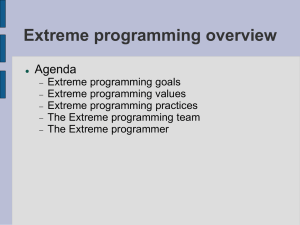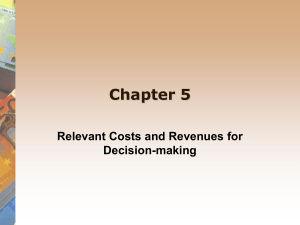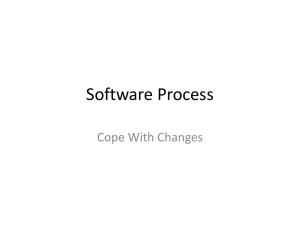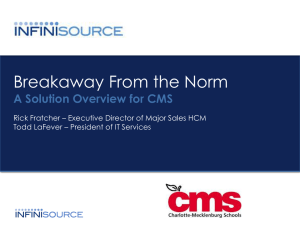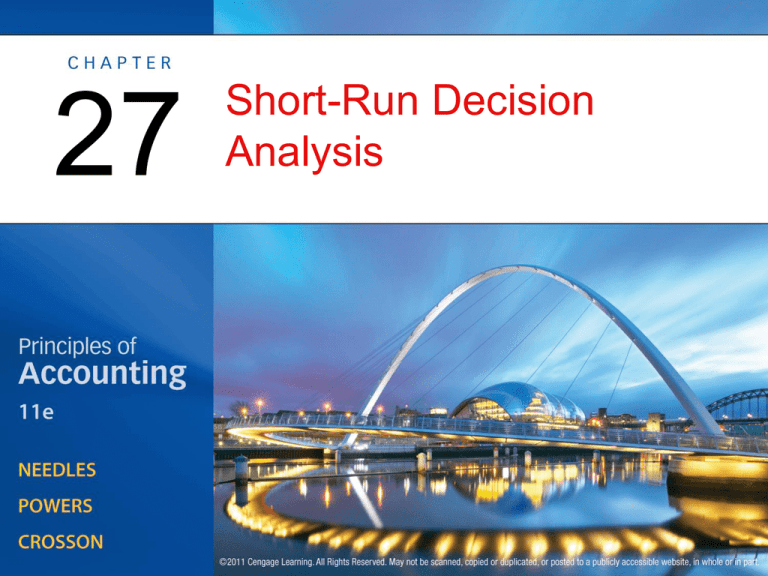
27
Short-Run Decision
Analysis
Short-Run Decision Analysis and the
Management Process
OBJECTIVE 1: Descibe how managers make
short-run decisions using incremental
analysis.
Exhibit 1: Incremental Analysis
Short-Run Decision Analysis and the
Management Process
• Short-run decision analysis is the
systematic examination of any decision
whose effects will be felt over the course of
the next year
– Discuss the quantitative information and
qualitative information that are important in
making short-run decisions.
Short-Run Decision Analysis and the
Management Process
• When performing short-run decision
analysis in the planning stage of the
management process, managers
– Discover a problem or need.
– Identify alternative ways of solving the
problem or meeting the need.
Short-Run Decision Analysis and the
Management Process
• When performing short-run decision
analysis in the planning stage of the
management process, managers (cont.)
– Analyze the effects of each solution.
– Select the best course of action.
Short-Run Decision Analysis and the
Management Process
• During the year, managers make many
decisions that affect their organization’s
profitability and liquidity in the short run.
Short-Run Decision Analysis and the
Management Process
• Incremental analysis in making short-run
decisions
– Irrelevant costs and revenues
• Differential cost or incremental cost
– Incremental analysis
• Sunk cost
– Opportunity costs
©2011 Cengage Learning All Rights Reserved. May not be scanned, copied or duplicated, or posted to a publicly accessible website, in whole or in part.
Incremental Analysis for Outsourcing
Decisions
OBJECTIVE 2: Perform incremental analysis
for outsourcing decisions.
Exhibit 2: Incremental Analysis:
Outsourcing Decision
Incremental Analysis for Outsourcing
Decisions
• Outsourcing decisions.
– Strong candidates include payroll processing,
training, managing vehicle fleets, sales and
marketing, custodial services, and information
management.
Incremental Analysis for Outsourcing
Decisions
• Outsourcing decisions. (cont.)
– Outsourcing can reduce a company’s
investment in physical assets and human
resource, which can improve cash flow.
– Exhibit 2 provides an example of incremental
analysis of an outsourcing decision.
©2011 Cengage Learning All Rights Reserved. May not be scanned, copied or duplicated, or posted to a publicly accessible website, in whole or in part.
Incremental Analysis for Special Order
Decisions
OBJECTIVE 3: Perform incremental analysis
for special order decisions
Exhibit 3: Incremental Analysis: Special
Order Decision
Incremental Analysis for Special Order
Decisions
• Decision to accept or reject a special order.
– Special order analysis
– Incremental analysis for special order decisions
generally ignores fixed costs.
Incremental Analysis for Special Order
Decisions
• Decision to accept or reject a special order.
(cont.)
– Price and relevant cost comparison.
– Minimum bid price for special order.
©2011 Cengage Learning All Rights Reserved. May not be scanned, copied or duplicated, or posted to a publicly accessible website, in whole or in part.
Incremental Analysis for Segment
Profitability Decisions
OBJECTIVE 4: Perform incremental analysis
for segment profitability decisions
Exhibit 4: Incremental Analysis: Segment
Profitability Decision
Exhibit 4: Incremental Analysis: Segment
Profitability Decision
Incremental Analysis for Segment
Profitability Decisions
• Segment profitability decisions
– A segment margin is a segment’s sales revenue
minus direct cost
• Positive segment margin: segment’s revenue is
greater than its direct costs.
• Negative segment margin: segment’s revenue is less
than its direct costs
Incremental Analysis for Segment
Profitability Decisions
• Segment profitability decisions (cont.)
– Includes preparation of segmented income
statement using variable costing to identify
variable and fixed costs.
• Direct fixed costs are traceable to the segment.
• Common costs are the remaining costs and are not
assigned to segments.
©2011 Cengage Learning All Rights Reserved. May not be scanned, copied or duplicated, or posted to a publicly accessible website, in whole or in part.
Incremental Analysis for Sales Mix
Decisions
OBJECTIVE 5: Perform incremental analysis
for sales mix decisions involving
constrained resources.
Exhibit 5: Incremental Analysis: Sales Mix
Decision Involving Constrained Resources
Exhibit 5: Incremental Analysis: Sales Mix
Decision Involving Constrained Resources
Incremental Analysis for Sales Mix
Decisions
• Sales mix decision.
– Steps involved in the decision analysis:
• For each product affected by the scarce resource,
calculate the contribution margin per unit by
subtracting the variable costs per unit from the
selling price.
Incremental Analysis for Sales Mix
Decisions
• Sales mix decision.
– Steps involved in the decision analysis: (cont.)
• For each product, calculate the contribution margin
per unit of the scarce resource (such as machine
hours) by dividing the contribution margin per unit
by the quantity of the scarce resource required per
unit.
Incremental Analysis for Sales Mix
Decisions
• Sales mix decision. (cont.)
– The alternative that maximizes the contribution
margin per scarce resource is the one that
should be selected.
©2011 Cengage Learning All Rights Reserved. May not be scanned, copied or duplicated, or posted to a publicly accessible website, in whole or in part.
Incremental Analysis for Sell or ProcessFurther Decisions
OBJECTIVE 6: Perform incremental analysis
for sell or process-further decisions.
Exhibit 6: Incremental Analysis: Sell or
Process-Further Decision
Incremental Analysis for Sell or ProcessFurther Decisions
• Incremental analysis of sell or processfurther decisions.
– Managers compare the incremental costs and
revenues of selling a joint product at the splitoff point with the incremental costs and
revenues of processing it further.
Incremental Analysis for Sell or ProcessFurther Decisions
• Incremental analysis of sell or processfurther decisions.
– Only costs that occur after the split-off point
are relevant.
– A product should be processed further only if
the incremental revenues generated exceed the
incremental costs incurred.
©2011 Cengage Learning All Rights Reserved. May not be scanned, copied or duplicated, or posted to a publicly accessible website, in whole or in part.

